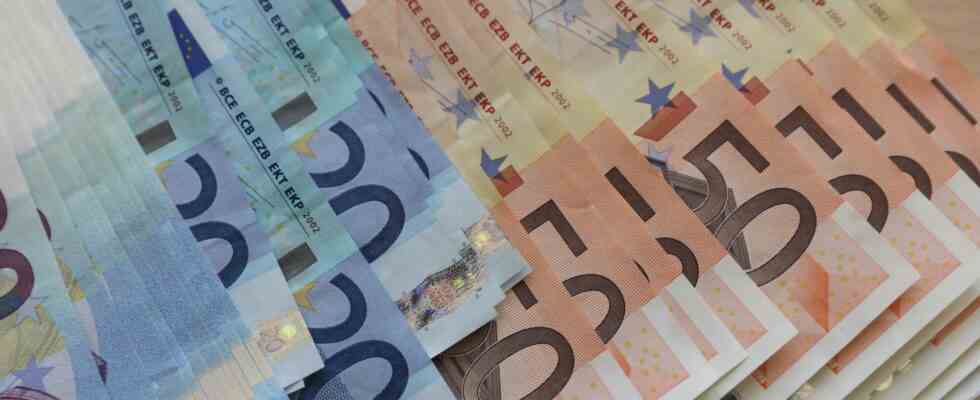analysis
Status: 09/30/2022 3:34 p.m
The federal government is currently making gigantic sums of billions loose: special assets, economic stabilization funds, defense shields – everything sounds better than incurring debt. How does that fit in with the debt brake?
Finance Minister Christian Lindner is satisfied: With the 200 billion defense shield, the government is sending out a double signal. First, a signal to Russia’s President Vladimir Putin: Germany will not be defeated in the energy war. In addition, a signal to the capital markets: “Behind the protective shield, we will continue to operate with the rules of the debt brake.” According to the FDP politician in the Bundestag, Germany, whose government bonds are popular with investors, will continue to be the “gold standard of state financing”.
The message is important for Lindner for two reasons: On the one hand, he has tied his political reputation to compliance with the debt brake of the Basic Law from next year. On the other hand, distrust on the markets means nothing other than higher interest rates, as can be seen in Great Britain in particular. Higher interest rates, however, put a strain on the state budget and thus restrict the finance minister’s room for manoeuvre.
Magic word: credit authorizations
Nevertheless, the federal government will face further debts, albeit under a different name. Credit authorizations – a magic word in financial policy for years. It means that the government will have Parliament approve loans for future projects as a precautionary measure. The expenditure is outside the federal budget and is the responsibility of the respective ministries, controlled by the budget committee of the Bundestag, but less in the public eye than the annual federal budget. The respective opposition parties therefore like to talk about shadow budgets.
Debts are often reallocated
The Basic Law itself speaks of special assets (Art. 110), regardless of whether these special assets are financed from tax revenue or – as is now the case with the Economic Stabilization Fund (WSF) – via new debt. Not all credit authorizations are needed for each target, but the remaining debt has almost never been waived in the past. Rather, the credit authorizations that have been granted are readily reallocated. Debts that were originally intended for Corona aid are now to be used to finance investments in climate protection – a decision by the traffic light coalition, which is still being reviewed by the Federal Constitutional Court at the request of the Union parliamentary group.
Credit authorizations are credited to the debt brake of the Basic Law in the year in which they are decided – not in the years in which they are used to finance expenditure. For Lindner, this means that although another exception to the debt brake in the Basic Law must be made this year, he can formally comply with the debt brake in the coming year.
Bypassing the debt brake?
From a legal point of view, this is not a problem. In accordance with Article 115 of the Basic Law, the Bundestag must determine with a majority of its members (i.e. the chancellor majority) that this is an exceptional situation. It applies “in the event of natural disasters or extraordinary emergency situations that are beyond the control of the state and have a significant impact on the state’s financial situation”. With reference to Corona, the debt brake has now been suspended for three years. Then there was the Bundeswehr special fund, which was decided on by changing the Basic Law.
De facto, more new debts will be approved this year than ever before in the history of the Federal Republic: almost 140 billion via the federal budget, 100 billion euros for the Bundeswehr and now the 200 billion euros for the WSF. In total, that is about as much as the entire federal budget for the coming year, which, according to the federal government’s plans so far, will actually incur only a few new debts. Of course, the state is allowed to spend significantly more due to the credit authorizations from previous years.
Nice budget
This raises the question of whether the actual purpose of the debt brake is still being adhered to. The left-wing politician Christian Leye has already made it clear in the Bundestag: “Today the debt brake is actually dead. It is buried. The mourners are on their way home. Only Christian Lindner is still standing at her grave and is trying to come to terms with her for 2023 to arrange.”
The Federal Audit Office also recently warned that the “true state of federal finances” is being obscured by the use of credit authorizations that were approved in previous years. This means that the debt rule is adhered to on paper: “Due to the actually significantly higher net new debt, however, its effectiveness is severely restricted.”
In favor of the incumbent finance minister, one must add that this is not a fundamentally new phenomenon. Even his predecessors – including Wolfgang Schäuble and Olaf Scholz – improved their households with the help of special funds. But the dimension is new: the “debt boom” that opposition politicians like Union parliamentary group leader Mathias Middelberg are now talking about.

